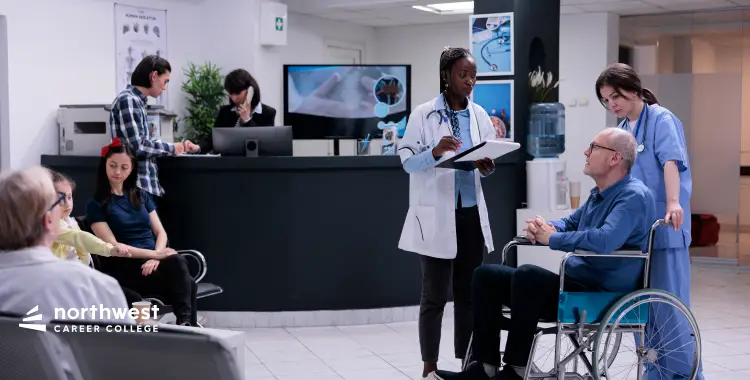The Surprising Challenges of a Healthcare Administration Career
- November 25, 2025
- 671 views
- 5 min read
When people think about a healthcare career, they often imagine surgeons in the operating rooms or nurses giving bedside care. However, behind any successful healthcare facility is the presence of a competent staff that works behind the scenes to ensure that a hospital or any clinic is well-taken care of.
Healthcare administration is usually a desk job that mainly deals with paperwork, timetables, and expense report headaches. And although it implied those responsibilities, the thing is much more complicated. Healthcare administration can be its brand of surprises, a blend of business sense, compassion, and flexibility.

Table of Contents
The healthcare industry is one of the most regulated industries worldwide. The rules are continuously changing, whether in fulfilling the HIPAA requirements, insurance policies, or state-specific regulations.
For healthcare administrators, this means there’s no such thing as “set it and forget it.” Each new regulation that is enacted or an older regulation updated means that administrators should make sure the organization complies. Depending on the case, that may include re-training the staff, altering internal processes, or even re-designing entire systems to handle the new demands.
Knowing the rules is essential, but that is only the first step in understanding how the rules are interpreted within the specific environment of your facility. And when legislation varies state by state or when it is changing at a moment’s notice, keeping up with the law becomes a full-time endeavor.
Balancing Financial Constraints with Quality Care
Healthcare administrators exist within a realm where two conflicting priorities are consistently in head-on collision: ensuring a healthcare operation remains financially viable and ensuring that the level of patient care available is at its peak.
Healthcare budgets are commonly lean, and they have scarce resources, be it personnel, technology, or equipment. Administrators have lots of difficult decisions to make:
- Does the hospital have the money to purchase new diagnostic equipment this year?
- Is it essential to reduce staffing hours to limit overtime expenses
- How will they remedy it by negotiating with insurance providers to have better rates?
The unexpected twist in this case is the fact that cost-cutting in the healthcare sector is not merely an economic choice, but it can have direct implications on patient outcomes. The strategic decision and skill of calculating the short-term money saving and long-term health implications are the conditions that can be made in this case.
Managing a Diverse and Specialized Workforce
Hospitals and healthcare facilities bring together a uniquely diverse workforce, including doctors, nurses, technicians, administrative staff, custodial teams, and more. Each group has different priorities, work schedules, and communication styles.
As an Administrator, you will often find yourself in the role of a translator, bridging the gap between medical staff and non-medical teams, ensuring everyone is working toward the same organizational goals.
Handling Crisis Situations—Without Medical Training
Healthcare administrators might not be directly carrying out surgical procedures, but they will be at the forefront when it comes to the way a facility deals with crises. When a sudden disease outbreak appears, a natural disaster happens, or a surprise surge of patients shows up, it is the role of administrators to coordinate resources, manage communications, and maintain operational stability.
Administrators need to make fast, high-stakes decisions, usually without any direct medical training, based on feedback provided by healthcare professionals and our emergency responses.
The COVID-19 pandemic showed how vital and stressful this job component can be. Healthcare administrators, meanwhile, had to deal with supply shortages, shifting safety directives, and massive patient loads, while maintaining staff morale.
Adapting to Rapid Technological Changes
Electronic health records (EHRs), telemedicine, artificial intelligence (AI) diagnostics, and robotic surgeries are no longer something exclusive; they are gradually becoming ordinary elements of patient care.
As healthcare administrators, you cannot pick and choose not to keep up. You need to study new tools, determine whether they are worth integrating, decide how to introduce them, and ensure that employees understand how to use them efficiently.
Yet, every new technology comes with its problems. Regardless, there is always a learning curve with the latest systems being put in place by the staff. Initial expenses might pressure budgets, and even the process to combine new tools and old processes may be complex.
Without the ability to adapt as fast as possible, you may put the facility at risk of falling behind the other providers, losing trust amongst patients, or providing care that does not match the modern standards. Remaining ahead is a balance- open to innovation and ensuring that the changes made are well thought-out, supported, and indeed beneficial to patient care.
Conclusion
Working in healthcare administration can be a very fulfilling profession, as you have the opportunity to ensure that patients receive the care they need, personnel perform their work efficiently, and amenities are well-maintained.
However, it is by no means an effortless course. You have to be analytical, have a strong understanding of finance, be empathetic, adapt to changes, and be wholeheartedly committed to providing quality care regardless of the circumstances.
Northwest Career College can help you achieve this new and exciting career with our Healthcare Administration Program. Our courses will equip and prepare you to become a successful practitioner in various settings, such as in hospital management or family practice. Through our program, you get to expand career opportunities, grow leadership skills, and contribute to your community positively.
Enroll today to study the Healthcare Administration Program to start your path to a career where you can lead, make a difference, and create the future of healthcare.





